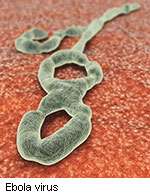(HealthDay)—The Ebola epidemic is spreading in West Africa, with little hope for treatment, and an experimental therapy is unlikely to be provided to African patients, according to two commentaries published online Aug. 19 in the Annals of Internal Medicine.
Carlos del Rio, M.D., from the Rollins School of Public Health of Emory University in Atlanta, and colleagues discuss the current outbreak of Ebola hemorrhagic fever in West Africa. The authors note that the incubation period ranges from two to 21 days. Initial symptoms are nonspecific and include sudden onset of fever, chills, myalgias, and malaise, followed by flu-like symptoms. Ebola diagnosis is challenging, with the most useful tests only available in referral centers or national reference laboratories. Patient management is mainly symptomatic and has not improved since the 1950s; antivirals have not proven useful in nonhuman primates. No licensed vaccine is currently available.
Nancy Kass, Sc.D., from the Johns Hopkins School of Public Health in Baltimore, discusses the ethical issues relating to the treatment with a highly experimental treatment of two American health care workers infected with Ebola. The author writes that the decision to provide treatment to these health care workers was reasonable, given that their chances of dying were greater than surviving, they already had significant symptoms, and they could understand the risks of treatment. However, it seems that the treatment should not yet be provided to African patients due to the fact that the threshold for rolling out a treatment program to an entire community is different from compassionate care for individual patients.
"The visibility of two treated Americans, however, has been a catalyst for debating whether, or under what circumstances, distribution of experimental drug within Africa is warranted," Kass writes.
More information:
Full Text - del Rio
Full Text - Kass
Journal information: Annals of Internal Medicine
Copyright © 2014 HealthDay. All rights reserved.



















